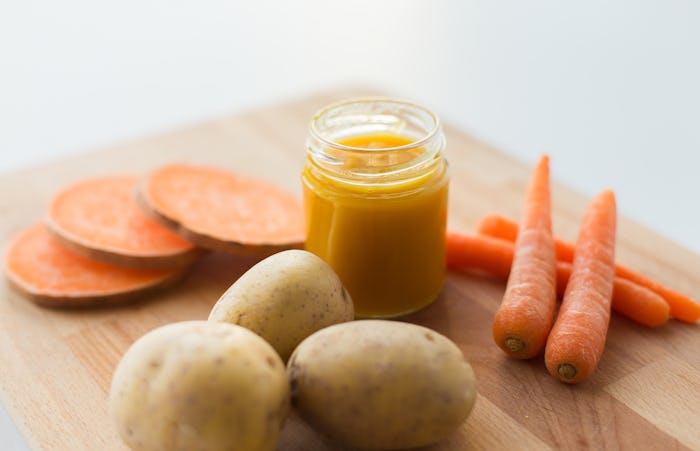Life

Here's How Long Homemade Baby Food *Actually* Lasts
Introducing your baby to solids is an exciting milestone full of spills, thrills, and well... more spills. All mess-related things aside, it's fun for the whole family to find out what tastes and textures delight your baby's taste buds. For many parents, homemade baby food is a more financially viable (and often more nutritious) alternative to the store-bought kind. But should you chuck that organic produce in favor or something that will, potentially, survive the shelf a little longer? How long does homemade baby food last, anyway? When you're trying to make wholesome, homemade food for your baby, it can be a lot of effort with not so much payoff. Some days, your baby may not be in the mood for, say, the peas and squash you literally just blended up and served. In other words, "thrifty" is the name of the game.
Depending on the type of ingredients used to make the homemade food, and how you are storing the food, there are different "shelf lives" for each. In terms of food safety, handling, and preparation, there is a slight difference of opinion in the exact length of time certain foods can be refrigerated or frozen, but they do tend to stay within a general range. When it comes to prepared baby foods that include meat, poultry, fish, or dairy product, the website Food Safety recommends storing them in the refrigerator for no more than 24 hours. For homemade foods comprised of fruits and vegetables, no more than 48 hours of refrigeration time is recommended.
As the website BabyCenter points out, families who make their own baby food, instead of using store-bought, do not ascribe to just one recipe or method, per se. When first embarking on your solid food journey with baby, you might choose to simply puree fruits, vegetables, grains, and other foods by mixing them with some breast milk, water, or formula. Or, you may go the route of pureeing what you and the rest of your family are eating into a consistency that your baby can manage. It is important to note what the ingredients are in each of your homemade foods, so that you can make an informed decision as to how long to store each food.
For a longer storage life, the Food and Drug Administration (FDA) recommends that you freeze homemade baby food by putting the mixture into an ice cube tray, covering it in plastic wrap, and placing it in the freezer. After they are frozen, you should put the cubes in a freezer bag or airtight container, and put the date on the outside. Once the storage time has exceeded three months, the FDA suggests throwing the food out. The website for the Food and Nutrition Service (FNS) of the United States Department of Agriculture (USDA), specifies throwing out homemade baby food where the ingredients include frozen animal foods after one month.
But what should you do with leftover homemade food after baby's had their way with it in the high chair? The answer might break your heart. When it comes to storing leftover baby food in the refrigerator after a meal, experts agree that you must throw away whatever food is left in baby's bowl so as not to risk the spread of bacteria. That means that when feeding baby, you'll be wise to portion out little bits of food onto their plates so you don't risk having to throw all your pureeing efforts out at once. BabyCenter advises parents to always use a clean spoon to serve baby food from its container, onto baby's plate or into their bowl. The FDA explains that the worry is that saliva from the spoon may contaminate the containing food in the jar.
Another PSA to parents? Make sure to put whatever you're finished serving back in that fridge, or say goodbye to the homemade goodness you spent time slaving over in the kitchen (OK, mashing up some sweet potato wasn't that hard, but still). The FDA's website instructs parents to throw out any perishable food items (such as homemade baby food) that has been out of the refrigerator without a cold source for more than two hours. Again, the issue here is the possible spread of bacteria, which can thrive on food (especially cooked meats) kept at room temperature.
When it comes to homemade baby food that you're just not sure about, the FNS/USDA encourages parents to use the concept, "If in doubt, throw it out." And don't bother with dipping your finger in it to see if the food has gone bad or if it's "fine." In the USDA's view, it is not even worth doing a taste test on the food, as "a food can contain disease producing micro-organisms yet taste normal." Consider that your food for thought.
Check out Romper's new video series, Romper's Doula Diaries:
Watch full episodes of Romper's Doula Diaries on Facebook Watch.